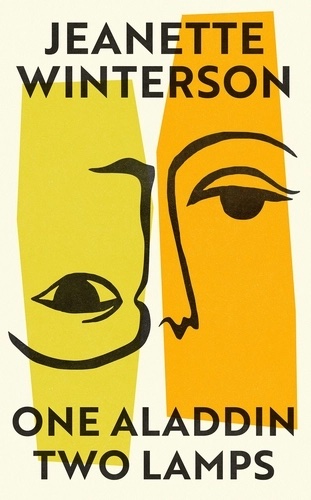Literature Editor CSENGE GY reads Jeanette Winterson’s One Aladdin Two Lamps.
One Aladdin Two Lamps opens in Winterson’s own past. We are taken along with her child self to a theatre trip provided by her father’s factory. But we do not linger here for long, as we do not linger anywhere for long. Winterson takes us on a whirlwind journey, jumping in time and between genres and topics with the same force.
At the heart of the novel is One Thousand and One Nights. Winterson’s explorations of literature, philosophy, science, and politics branch out, like pulsing veins, from this centre, from Darwin to Beckett to Elon Musk. Just as One Thousand and One Nights is framed by the story of Shahryar and Shahrazad, a woman telling stories to a Sultan every night to defer her execution, so is One Thousand used as Winterson’s own framing device for storytelling. This is where the layers begin. As the novel runs on, they multiply, grow thicker. Often we find ourselves in the midst of a story from One Thousand recounted to us by Winterson, but told by Shahrazad, when a character begins to tell a story of their own —stories within stories, infinitely regressing or unfurling; multiplying in either direction. Storytelling is interrupted only by the rising of the sun that marks the end of each night.
“The single night allotted to her by the Sultan swells to a thousand more. And then, onwards, into a future whose beats cannot be counted.”
These are stories about stories. Stories where time is always on the edge of running out, where we can never escape its endless cyclicality. Shahrazad disrupts time to save herself. Against tradition, it is not her, the woman, who is interrupted, but time.
“Modern life is predicated on constant interruption – and humans adapt. Women’s lives, traditionally, are a site of interruption.”
Throughout the work, this interruptive disruption is displaced from women onto the concept of time. Everything in the narrative reflects something old, or something new. Everything forces reflection. Winterson’s own disruption is of genre. She traverses in time as she traverses between genres, with an endless fluidity. Just as Shahrazad escapes from the claws of time, Winterson escapes from restrictions of genre, and takes us somewhere further than fiction or non-fiction. That space is the in-between. She swims between memoir and science. History and retelling. Shakespeare and AI. The personal is fluid and it becomes one with the canon, with the political. She swims and takes us with her. We are the Jinn in a jar pulled out by the Fisherman’s net in Shahrazad’s story. We surface in moments of poetics, disguised as prose, that we can never leave unchanged.
“So many stories. Today I am a greyhound. Tomorrow I am a beautiful girl. Today I have no corporeal presence. Tomorrow I am by your side.”
This novel is an exploration of storytelling , but it is more than that. If Shahrazad’s stories teach us anything it is that things are always more than they seem. This is a call to action. This is a retelling. This is a life lived.
“Perhaps both. Whatever. Nothing will be the same again.”
It is a dismissal of the hold time has over us, of the hold any system has over us. It is a sonnet addressed to imagination. To illusions. Fiction can change our lives, and we, as agents of fiction can change our lives, if only we can envision it.
“I can change the story because I am the story.”
But to wield the power of fiction, to find ourselves in the midst of a new world, we must first find ourselves in reality. We must find the extraordinary in the ordinary. Fiction, Winterson argues, is most powerful when we become entirely present in our own lives, something technology makes growingly difficult. But nothing is unmovable. The stories in One Thousand and One Nights are endless —one morphs into the next. Tomorrow, there’s always more Tragedy. Revenge. And when the end must arrive there is Forgiveness. And there’s one more thing: Language.
Language allows Shahrazad to save herself. To change the Sultan, to speak through others, blamelessly. Through language she is empowered, in control. When meaninglessness might prevail, there we find language; where we fear it might fail us, it never really does.
“When we have no words, still, words are there.”
Winterson aligns the power of fiction and art in general, with the power of love. The same way fiction can charm us into a new reality by bringing us closer to our own reality, love makes us take note of our surroundings. We are anchored to reality under the all-encompassing authority of love. But as any metaphor in any love poem will tell us, it also whisks us away into a world of vivid images and incomparable comparisons. Love breeds new language.
“Waking or sleeping, our beloved is our new-found land. Every rustle and curve, every bend and mound, must be mapped.”
This is a love letter to fiction. This is a love letter to language. This is a love letter.
One Aladdin Two Lamps releases on November 13th, 2025, through Jonathan Cape. Image courtesy of Penguin Books.

